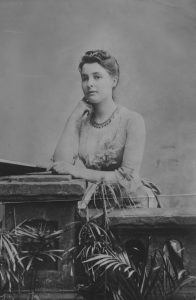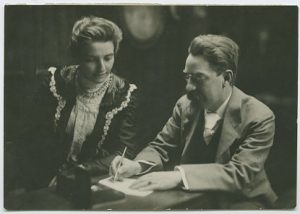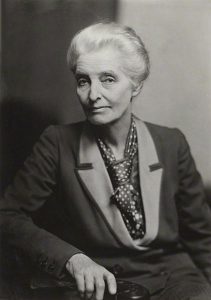Beatrice Webb (1858-1943)
“. . . if I had been a man, self-respect, family pressure and the public opinion of my class would have pushed me into a money-making profession; as a mere woman I could carve out a career of disinterested research”
Women of different backgrounds and countries have tried multiple tactics to combat the oppressive nature of the social construction of femininity. Through militant actions or more conventional methods, women have been at the forefront of this battle since the late eighteenth century. English sociologist, economist, socialist, labor historian and social reformer, Beatrice Webb (1858-1943), became together with her husband Sidney Webb (1859-1947), who was a economist and socialist too, famous for her fight for social and educational reform and women’s equality in twentieth century Britain.
Born as Beatrice Potter to the rich industrialist Richard Potter and his wife, Laurencina Heyworth, a Liverpool merchant’s daughter, she grew up in the Standish House in the village of Standish, Gloucestershire in a wealthy upper-class family that supported the Liberal Party. Her paternal grandfather was Liberal Party MP Richard Potter. In young age she met major political figures and intellectuals who visited her parents and was early introduced to the thinking of liberal political theorist, Herbert Spencer, and his ideas the cooperative movement. She gained insightful experience on social discrimination by conversations with her cousin-in-law, Charles Booth, who at the time was doing research on the Victorian slums of London.
Through Booth, Webb was eventually introduced to her future husband, Sidney Webb, an earlier member of the Fabian Society, a socialist organization that became in 1900 one of the co-founders of the British Labour Representation Committee. Beatrice Potter contacted Webb for advice on the subject of housing and poverty. His knowledge of economics and pursuit of philanthropy aligned with Beatrice’s values. They became a couple and married in 1892. Beatrice Webb joined the Fabian Society too, both became respected leaders of this association. With other members of the Fabian Society, the Webbs founded the London School of Economics and Political Science in 1895 in order to challenge the biased social constructs facing the lower class at the time through the advancement of concept and knowledge revolved around the improvement of livelihood for her all country’s people.
One of Beatrice Webb’s most famous early contribution to the socialist movement was her 1891 book The Cooperative Movement in Great Britain. She used the knowledge she gained from previous research projects on poverty in order to distinguish the boundaries between “cooperative federalism” and “cooperative individualism.” Cooperative individualism focuses on the encouragement of manufacturers and distributors to form their own organizations and volunteer information to the federal government in an effort to stimulate the economy while cooperative federalism focuses on national, state, and local governments interacting cooperatively and collectively to solve common problems. She presented the reader with the general image of the working conditions and “spirit of association” it brought along with it. The idea of “spirit of association” revolves around Tocqueville’s idea that there would be considerable benefits if men and women were “to associate freely in everything.” She advocated for an equally dispersed form of socialism that kept those who benefited from these specific types of worker cooperatives to control the market. Ultimately, through her work, she coined the term “collective bargaining,” defined as the negotiation between an employer and a labor union usually on wages, hours, and working conditions.
Webb also served as a member of the Royal Commission on the Poor Laws and Relief of Distress between 1905-1909. The existing Poor Law provided poor relief by the government via social services and monetary loans to ease poverty. Beatrice Webb was appointed to reform the existing Poor Law and believed that it was a “short sighting” of society to expect those in poverty to be held accountable for themselves. Along with other commissioned personnel, Webb argued in the so-called Minority Report of the Royal Commission that the Poor Law lacked a structural understanding of the causes of poverty. Because of this, a complete overhaul was needed in order for the state to relieve poverty in its entirety. A state-mandated basic minimum standard of living, she argued, was a collective responsibility instead of an individual responsibility indebted to a sole person. She believed that the state should take the initiative to ensure individuals a basic standard of living without any financial setbacks through social services. However, the Minority Report overhaul failed to capture support and was disregarded due to its lack of emphasis of individual responsibilities. While it failed pass through the Parliament, historians argue that the report— with over 25,000 copies sold by the Fabian Society—created a platform for the Labour Party that would eventually rise to power.
Webb continued to support the Labour Party and its socialist politics during the Interwar period. In 1932 she was invited to visit the Soviet Union. Although she expressed her disapproval of the absence of political freedom in Stalin’s communist system, she was thoroughly impressed with the improvement in the health, social and educational services that were available to Soviet citizens. The Soviet Union had also implemented laws that ensured women political and economic, social and political equality. Despite the lack of any autonomy in politics, Webb believed that the economic system that Stalin had implemented would “spread to the rest of the world” due to its emphasis on community consumption rather than individual consumption. In 1942, Beatrice and her husband published The Truth About Soviet Russia in support of the economic system that stressed communal responsibility.
Beatrice Webb shortly passed away in 1943, a year after publishing her latest book following her trip to the Soviet Union. Her contributions to the world via economic advancement and social policy-making can still be seen in the world today.
Francisco Nguyen, Psychology, Class of 2018
Sources
Literature and Websites
- Webb, Beatrice. The Co-Operative Movement in Great Britain. London: S. Sonnenschein, 1895.
- “Fabian Society.” Encyclopædia Britannica, at: https://www.britannica.com/topic/Fabian-Society (Accessed April 15, 2018).
- Brown, John, and John Brown. “Webb, Beatrice 1858-1943.” In Reader’s Guide to British History, ed. D. M. Loades. London: Routledge, 2003.
- “Webb, Beatrice Potter.” In The Columbia Encyclopedia, ed. Paul Lagasse. New York: Columbia University Press, 2017.
- “Webb, Sidney James (1859-1947) Ld. Passfield (1929) and Beatrice neé Potter (1858 – 1943).” In The Companion to British History, ed. Charles Arnold-Baker. 2nd ed. London: Routledge, 2001.
- “Beatrice Webb,” Wikipedia, at: https://en.wikipedia.org/wiki/Beatrice_Webb (Accessed April 13, 2018).



